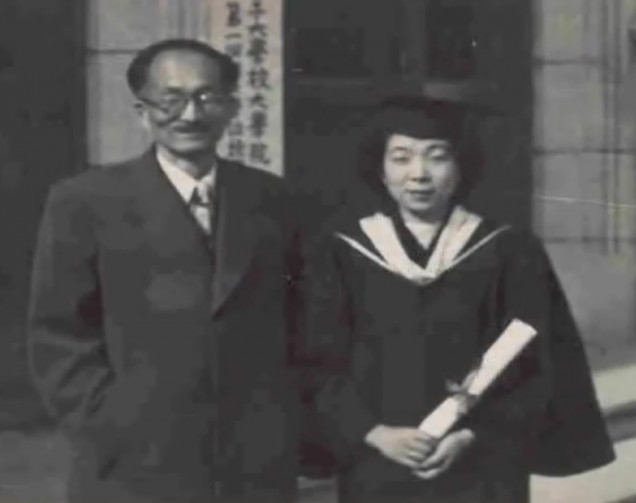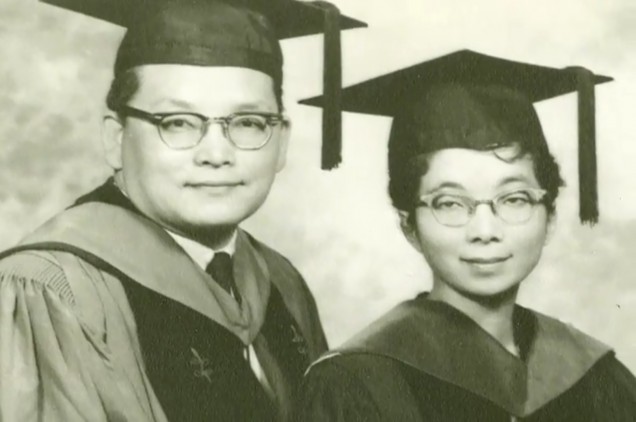Ko Tong-hye: A Bridge for Korean Immigrants in Chicago
Among the first generation of Korean leaders in the United States, Ko Tong-hye is a towering figure. She worked for Korean immigrants, helping them transition to living in the United States. She served Korean communities as a psychologist, found creative ways to help Korean immigrants maintain their ethnic identity, and established institutes for Korean studies. Her work in the second half of the twentieth century strengthened the voices and presence of Korean immigrants in the United States.

Ko (Chu) Tong-hye was born on April 9, 1929 in Korea as the second daughter of Chu Yo-han, who was a famous Korean poet. She received her Bachelor of Arts in English Literature at Ewha Womans University in 1950.[1] While studying as a graduate student at Ewha, the school offered her the opportunity to teach undergraduates as the Korean War had led to a shortage of faculty. On March 19, 1954, she earned a Master of Arts in psychology—one of the first five Korean female students to gain a master’s degree in Korea.[2] Ko Sun-deok, her professor who later became her spouse, advised her master’s thesis, “A study of the time error in esthetic judgements of auditory stimuli.”[3]
Her academic journey continued in the United States upon her arrival in 1954. At the University of Minnesota, she received an additional Master’s degree in psychology.[4] Ko then moved to Boston to pursue a Doctor of Philosophy in psychology and, in 1960, Boston University awarded her the first doctoral degree in psychology ever given to a Korean woman.[5]

In Boston, she reunited with her master’s advisor Ko Sun-Deok, who was studying at Harvard University, and who in 1959—one year before she received her diploma—graduated as the first Korean to earn a doctorate in psychology.[6] She married him in 1963 in New York and went back to Minnesota to work at Faribault State Hospital.[7] The fact that the couple both worked in psychology proved beneficial, as they supported and sharpened one another’s ideas until they became leading scholars in their discipline.
Ko Tong-hye settled in Chicago after her work in Minnesota. She was a professor of psychology at the University of Illinois in Chicago until her retirement in 1996. She also worked as an independent clinical psychologist and helped Korean immigrants settle in the Chicago area.[8]
Ko’s contribution to Korean immigrants in Chicago, especially women, was outstanding. With Hong Seongok, Ko Nankyeong, and Jang Jaseon, she established the Korean American Women’s Association of Chicago in 1980 with the purpose of supporting Korean immigrant women. Through the association, Ko helped them create a place for themselves as an immigrant community, but one that could also adapt to American ways of life.[9] Her role as the director of the television program “Women’s Corner,” which aired on Chicago Access Network Television (Can TV), was a powerful vehicle for informing Korean women about issues pertinent to their lives. Ko was the show’s narrator from 1991 to 2005.[10]
Ko was instrumental in organizations that tied Korean-Americans together. She poured her irrepressible energy into the Center for Korean Studies at North Park University. She helped found the institution and was involved in its programs.[11] In addition, she became the first president of the Ewha Womans University Alumnae Association of North America in 2001. In that role, she organized regular meetings and supported Ewha alumnae throughout the United States.[12] Near the end of her life, she and her family established the Song-A Literature Foundation in 2000. The purpose was to offer financial aid to Koreans who write Korean poems as her father, Chu Yo-han, did.
Ko laid the groundwork for Korean immigrant society in Chicago. She worked for Korean immigrants, provided them with information for living in the United States, advertised the presence of the Korean community, and fought for the extension and development of Korean women’s rights. Before she passed away in 2009, the Korean government awarded her “the Civil Merit Medal” in recognition of outstanding service to Korean communities, especially in Chicago.[13]
[1] Ho-Youn Kwon, Kwang Chung Kim, and R Stephen Warner, Korean Americans and Their Religions: Pilgrims and Missionaries from A Different Shore (University Park, PA: Pennsylvania State University Press, 2001), 296.
[2] Jaeho Cha, “The Development of Korean Psychology and its Present Status,” Korean Social Science Vol 1&2 (2005): 175; The Hundred Year History of Ewha Womans University Vol 1 (Seoul: Ewha Womans University Press, 1994), 335; “Five Female Graduates Awarded Master’s Degree at Ewha Womans University,” The Dong-A Ilbo, March 18, 1954, accessed December14, 2015, http://newslibrary.naver.com/viewer/index.nhn?articleId=1954031800209202004&editNo=1&printCount=1&publishDate=1954-03-18&officeId=00020&pageNo=2&printNo=9519&publishType=00020
[3] Kwang-O Lee, “The History of Experimental and Cognitive Psychology,” Korean Society for Cognitive and Biological Psychology, accessed December 05, 2015, https://cogpsych.jams.or.kr/co/com/EgovMenu.kci?s_url=/sj/config/soceHomePgConf/guide/sjGuidNewView.kci?guidSeq=000000000006&s_MenuId=MENU-000000000011000&s_tabId=1&accnId=AC0000000004
[4] Trailblazers: Korean American Women Ahead of Their Time, Directed by KOWIN Chicago Chapter (Chicago; KOWIN, 2010), DVD.
[5] “The First Korean Female Doctorate in Psychology, Tong-He Koh at Boston University,” The Kyunghyang Shinmun, July 08, 1960, accessed November 23, 2015,
[6] “Tong-He Koh leaves Chicago,” The Korea Times, September 20, 2007, accessed November 21, 2015, http://www.koreatimes.com/article/406105
[7] Tong-He Koh lived as Tong-He Chu until before her marriage with Soon-Duk Koh as her father’s last name was Chu. However, the marriage caused her to change her family name from Chu to Ko; Trailblazers, Directed by KOWIN Chicago Chapter, DVD.
[8] Won Moo Hurh, The Korean Americans (Westport, Connecticut; Greenwood Press, 1998), 171; Kwon, Kim, and Warner, Korean Americans and Their Religions, 296.
[9] “The New President of Korean American Women’s Association of Chicago Myeonghoe Jeon,” Radio Free Asia, April 02, 2010, accessed December 22, 2015, http://www.rfa.org/korean/weekly_program/korean_world/chicago_korean_committee-04022010120053.html
[10] Mijun Bae, “Tong-He Koh Passed on Her Position,” The Joongang Ilbo Chicago, September 15, 2015, accessed December 23, 2015, http://www.koreadaily.com/news/read.asp?art_id=372285
[11] Ungjin Park, “Tong-He Koh Passed Away,” The Korea Times, April 14, 2009, accessed December 27, 2015, http://sf.koreatimes.com/article/517021
[12] “Establishing the Ewha Womans University Alumnae Association of North America,” Ewha Womans University Alumnae Association of North America, accessed December 27, 2015, http://www.ewhaian.org/ewhaian/newsletter_2001/newsletter-A.htm
[13] Yunsik Bong, “Seheum Hong, Tong-he Koh, and Inhong Cha,” The Korea Times, January 11, 2007, accessed http://www.koreatimes.com/article/359402
Written by: Younghwa Kim
Edited by: Daryl Ireland